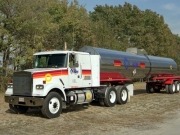
The introduction of greener vehicles such as hybrids and EV’s could help to secure significant efficiency gains in the road freight sector as well as helping to cut carbon emissions a new report commissioned by the Transport Knowledge Transfer Network (TKTN) and the Low Carbon Vehicle Partnership (LowCVP) has revealed.
Written by Ricardo-AEA for the project partners the report focuses on key technical opportunities but also identifies the major barriers to adoption of carbon reduction technologies in the freight sector, which is currently responsible for around 7% of the UK’s total carbon emissions. Other approaches identified by the report include a shift to biogas (biomethane) which could help achieve a 65% saving in well-to-wheel (WTW) emissions. Hybrid and pure electric vehicles are particularly suited to urban delivery and municipal duties the report states, an activity which accounts for around 14% of all HGV-based carbon emissions. Switching to hybrids and EV’s could deliver 20-50% emissions savings on a WTW basis with added benefits emerging from improvements in urban air quality and noise reduction.
Over half the energy transmitted to the wheels of a typical long haul HGV is estimated to be lost in rolling resistance with over a third lost as aerodynamic drag. The report reveals that more could be done to address these factors including adopting low rolling resistance technologies and single wide tyres as well as aerodynamic aids, thereby delivering a further 10% WTW carbon saving while also potentially cutting vehicle operation costs. The report also found that long haul and regional deliveries account for about 70 % of UK HGV CO2 emissions and therefore suggests that efforts should be focused here.
The Ricardo-AEA report draws on the work of the Task Force on Fuel Efficient, Low Emission HGV technologies, a joint industry/government initiative aimed at promoting the use of fuel efficient, low emission road freight technologies. Member organisations include the LowCVP, the Society of Motor Manufacturers and Traders (SMMT), the Transport Knowledge Transfer Network (KTN), The Chartered Institute of Logistics and Transport, Freight Transport Association (FTA) and the Road Haulage Association (RHA).
“Switching from diesel to gas provides one of the clearest opportunities for cutting freight sector emissions” said Andy Eastlake, Managing Director of the LowCVP. “The Low Carbon Truck trials are a good start but we need a long-term road transport gas strategy to build on the progress made so far. Like the car market, the hybrid truck market would benefit from incentives to encourage early adoption. Accrediting fuel saving technologies such as aerodynamic aids and low-rolling-resistance tyres would also accelerate market uptake of these helpful carbon and, potentially, cost-reduction technologies. Importantly, many of these opportunities are both complimentary to each other and to the wealth of work already underway within the industry using telematics, driver training and logistics efficiency improvements.”
Neil Ridley, Transport KTN Director, said that the freight sector is of strategic importance to the UK economy and therefore sector needs to be supported in its adoption of low carbon technologies.
“Drawing on learning from other sectors, this report enables all involved in the freight and logistics industry to easily identify the most significant contributors to carbon reduction and fuel improvements by vehicle duty cycle” he said.
Further information:

